#tech oligopoly
Text
Seven companies - Google, Amazon, Facebook, Apple, Amazon, Microsoft and Tencent (GAFAAMT) - each have more users than the population of most countries.
In the space of a couple of decades, they have become the most profitable companies, competing with oil companies, car makers and banks.
2 notes
·
View notes
Text
Now I'm sad. Glimesh was a streaming site I used for a while, I really liked it.
It was also nice that as a independent form twitch and YouTube and all those oligopolies, it was more on the side of the user.

but eventually it had to close down like all awesome things, and this is all it is now.
It says, "
Here lies Glimesh,
the best streaming site to ever exist.
"
The background is a list of all the usernames, including mine.

#I'm breaking down#why can't the smaller option ever succeed#internet#oligopolies#big tech vs small tech#glimesh#livestream#livestreaming#live streaming#touching#twitch#youtube
1 note
·
View note
Text
A good episode. Don’t you feel nostalgic for a time, before the crazy, when big-brain experts would have a respectful interdisciplinary dialogue about solving knotty socio-philosophical issues with real impact?
#twitter elon musk#algorithmic bias#algorithm#algorithmicdesign#social media#audit#market manipulation#manipulation#communication#oligopoly#tech#psychology#freedom of speech#freedom of expression#town square#civil rights#human rights#content moderation#choices#autonomy#software#SEO#governance#regulation#mobile apps#beta testing#intellectual property#news#current affairs
0 notes
Text
The IRS will do your taxes for you (if that's what you prefer)

This Saturday (May 20), I’ll be at the GAITHERSBURG Book Festival with my novel Red Team Blues; then on May 22, I’m keynoting Public Knowledge’s Emerging Tech conference in DC.
On May 23, I’ll be in TORONTO for a book launch that’s part of WEPFest, a benefit for the West End Phoenix, onstage with Dave Bidini (The Rheostatics), Ron Diebert (Citizen Lab) and the whistleblower Dr Nancy Olivieri.

America is a world leader in allowing private companies to levy taxes on its citizens, including (stay with me here), a tax on paying your taxes.
In most of the world, the tax authorities prepare a return for each taxpayer, sending them a prepopulated form with all their tax details — collected from employers and other regulated entities, like pension funds and commodities brokers, who must report income to the tax office. If the form is correct, the taxpayer signs it and sends it back (in some countries, taxpayers don’t even have to do that — they just ignore the return unless they want to amend it).
No one has to use this system, of course. If you have complex finances, or cash income that doesn’t show up in mandatory reporting, or if you’d just prefer to prepare your own return or pay an accountant to do so for you, you can. But for the majority of people, those with income from a job or a pension, and predictable deductions, say, from caring for minor children, filing your annual tax return takes between zero and five minutes and costs absolutely nothing.
Not so in America. America is one of the very few rich countries (including Canada, though this is changing), where the government won’t just send you a form containing all the information it already has, ready to file. As is common in complex societies, America has a complex tax code (further complexified by deliberate obfuscation by billionaires and their lickspittle Congressjerks, who deliberately perforate the tax code with loopholes for the ultra-rich):
https://pluralistic.net/2021/08/11/the-canada-variant/#shitty-man-of-history-theory
That complexity means that most of us can’t figure out how to file our own taxes, at least not without committing scarce hours out of the only life we will ever have to poring over the ramified and obscure maze of tax-law.
Why doesn’t the IRS just send you a tax-return? Well, because the tax-prep industry — an oligopoly dominated by a handful of massive, ultra-profitable firms — bribes Congress (that is, “lobbies”) to prohibit this. They are aided in this endeavor by swivel-eyed lunatic anti-tax obsessives, like Grover Nordquist and Americans for Tax Reform, who argue that paying taxes should be as difficult and painful as possible in order to foment opposition to taxation itself.
The tax-prep industry is dominated by a single firm, Intuit, who took over tax-prep through its anticompetitive acquisition of TurboTax, itself a chimera of multiple companies gobbled up in a decades-long merger orgy. Inuit is a freaky company. For decades, its defining CEO Brad Smith ran the company as a cult of personality organized around his trite sayings, like “Do whatever makes your heart beat fastest,” stenciled on t-shirts worn by employees. Other employees donned Brad Smith masks for selfies with their Beloved Leader.
Smith’s cult also spent decades lobbying to keep the IRS from offering a free filing service. Instead, Intuit joined a cartel that offered a “Free File” service to some low- and medium-income Americans:
https://www.propublica.org/article/inside-turbotax-20-year-fight-to-stop-americans-from-filing-their-taxes-for-free
But the cartel sabotaged Free File from the start. They blocked search engines from indexing their Free File services, then bought Google ads for “free file” that directed searchers to soundalike programs (“Free Filing,” etc) that hit them for hundreds of dollars in tax-prep fees. They also funneled users to versions of Free File they were ineligible for, a fact that was only revealed after the user spent hours painstaking entering their financial information, whereupon they would be told that they could either start over or pay hundreds of dollars to finish filing with a commercial product.
Intuit also pioneered the use of binding arbitration waivers that stripped its victims of the right to sue the company after it defrauded them. This tactic blew up in Intuit’s face after its victims banded together to mass-file thousands of arbitration claims, sending the company to court to argue that binding arbitration wasn’t enforceable after all:
https://pluralistic.net/2022/02/24/uber-for-arbitration/#nibbled-to-death-by-ducks
But justice eventually caught up with Intuit. After a series of stinging exposes by Propublica journalists Justin Elliot, Paul Kiel and others, NY Attorney General Letitia James led a coalition of AGs from all 50 states and DC that extracted a $141m settlement for 4.4 million Americans who had been tricked into paying for Turbotax services they were entitled to get for free:
https://www.msn.com/en-us/news/us/turbotax-to-begin-payouts-after-it-cheated-customers-new-york-ag-says/ar-AA1aNXfi
Fines are one thing, but the only way to comprehensively end the predatory tax-prep scam is to bring the USA kicking and screaming into the 20th century, when most of the rest of the world brought in free tax-prep for ordinary income earners. That’s just what’s happening: the IRS is trialing a free tax prep service for next year’s tax season:
https://www.washingtonpost.com/business/2023/05/15/irs-free-file/
This, despite Intuit’s all-out blitz attack on Congress and the IRS to keep free tax-prep from ever reaching the American people:
https://pluralistic.net/2023/02/20/turbotaxed/#counter-intuit
That charm offensive didn’t stop the IRS from releasing a banger of a report that made it clear that free tax-prep was the most efficient, humane and cost-effective way to manage an advanced tax-system (something the rest of the world has known for decades):
https://www.irs.gov/pub/irs-pdf/p5788.pdf
Of course, Intuit is furious, as in spitting feathers. Rick Heineman, Intuit’s spokesprofiteer, told KQED that “A direct-to-IRS e-file system is wholly redundant and is nothing more than a solution in search of a problem. That solution will unnecessarily cost taxpayers billions of dollars and especially harm the most vulnerable Americans.”
https://www.kqed.org/news/11949746/the-irs-is-building-its-own-online-tax-filing-system-tax-prep-companies-arent-happy
Despite Upton Sinclair’s advice that “it is difficult to get a man to understand something, when his salary depends on his not understanding it,” I will now attempt to try to explain to Heineman why he is unfuckingbelievably, eye-wateringly wrong.
“e-file…is wholly redundant”: Well, no, Rick, it’s not redundant, because there is no existing Free File system except for the one your corrupt employer made and hid “in the bottom of a locked filing cabinet stuck in a disused lavatory with a sign on the door saying ‘Beware of the Leopard.’”
“nothing more than a solution in search of a problem”: The problem this solves is that Americans have to pay Intuit billions to pay their taxes. It’s a tax on paying taxes. That is a problem.
“unnecessarily cost taxpayers billions of dollars”: No, it will save taxpayers the billions of dollars (they pay you).
“harm the most vulnerable Americans”: Here is an area where Heineman can speak with authority, because few companies have more experience harming vulnerable Americans.
Take the Child Tax Credit. This is the most successful social program in living memory, a single initiative that did more to lift American children out of poverty than any other since the days of the Great Society. It turns out that giving poor people money makes them less poor, which is weird, because neoliberal economists have spent decades assuring us that this is not the case:
https://pluralistic.net/2023/05/16/mortgages-are-rent-control/#housing-is-a-human-right-not-an-asset
But the Child Tax Credit has been systematically sabotaged, by Intuit lobbyists, who successfully added layer after layer of red tape — needless complexity that makes it nearly impossible to claim the credit without expert help — from the likes of Intuit:
https://pluralistic.net/2021/06/29/three-times-is-enemy-action/#ctc
It worked. As Ryan Cooper writes in The American Prospect: “between 13 and 22 percent of EITC benefits are gulped down by tax prep companies”:
https://prospect.org/economy/2023-05-17-irs-takes-welcome-step-20th-century/
So yes, I will defer to Rick Heineman and his employer Intuit on the subject of “harming the most vulnerable Americans.” After all, they’re the experts. National champions, even.
Now I want to address the peply guys who are vibrating with excitement to tell me about their 1099 income, the cash money they get from their lemonade stand, the weird flow of krugerrands their relatives in South African FedEx to them twice a year, etc, that means that free file won’t work for them because the IRS doesn’t actually understand their finances.
That’s a hard problem, all right. Luckily, there is a very simple answer for this: use a tax-prep service.
Actually, it’s not a hard problem. Just use a tax-prep service. That’s it. No one is going to force you to use the IRS’s free e-file. All you need to do to avoid the socialist nightmare of (checks notes) living with less red-tape is: continue to do exactly what you’re already doing.
Same goes for those of you who have a beloved family accountant you’ve used since the Eisenhower administration. All you need to do to continue to enjoy the advice of that trusted advisor is…nothing. That’s it. Simply don’t change anything.
One final note, addressing the people who are worried that the IRS will cheat innocent taxpayers by not giving them all the benefits they’re entitled to. Allow me here to simply tap the sign that says “between 13 and 22 percent of EITC benefits are gulped down by tax prep companies.” In other words, when you fret about taxpayers being ripped off, you’re thinking of Intuit, not the IRS. Just calm down. Why not try using fluoridated toothpaste? You’ll feel better, and I promise I won’t tell your friends at the Gadsen Flag appreciation society.
Your secret is safe with me.

Catch me on tour with Red Team Blues in Toronto, DC, Gaithersburg, Oxford, Hay, Manchester, Nottingham, London, and Berlin!


If you’d like an essay-formatted version of this thread to read or share, here’s a link to it on pluralistic.net, my surveillance-free, ad-free, tracker-free blog:
https://pluralistic.net/2023/05/17/free-as-in-freefile/#tell-me-something-i-dont-know

[Image ID: A vintage drawing of Uncle Sam toasting with a glass of Champagne, superimposed over an IRS 1040 form that has been fuzzed into a distorted halftone pattern.]
#pluralistic#earned income tax credit#eitc#irs#grover nordquist#guillotine watch#turbotax#taxes#death and taxes#freefile#monopoly#intuit
176 notes
·
View notes
Quote
But the ideals of collaboration and co-invention — sharing and caring — deserted Big Tech some time ago. Today a pantheon of overmen have consolidated an oligopoly and deliberately styled it as authoritarian. Rather than attracting our eyeballs, the oligarchs seem to want to poke them out.
Elon Musk just X’d out the sharing, caring ethos of the internet once and for all
2 notes
·
View notes
Text
DIY MEDIA
I wrote this in 2015 and updated it slightly in 2017. These ideas are central to all the work that I do.
Comcast (through merger with GE/NBC/Universal), Viacom, Disney (who now controls most of Newscorp/Fox’s media), CBS, and Time Warner currently control 90% of American media. This media oligopoly is more dangerous than we often give it credit for. These five companies exert incredible power over our modern political landscape. (They are responsible for things like the DMCA, and the TPP, EME, and today’s Net Neutrality decision, in addition to our ever increasing copyright terms.)
They collectively control so much of our political and economic landscape that it’s difficult to effectively understand, or begin to trace, the breadth of their influence. And that’s without stopping to consider how much the media we consume can shape our views. It’s hard to believe that the near constant coverage of President Trump in the months before the election didn’t influence his performance in the election.
We are constantly bombarded with entertainment and news media from these five companies, to the point that it is nigh inescapable. Even if the companies that feed us our news and entertainment were benign (and, don’t kid yourself, they aren’t), it would be nearly impossible to keep their biases out of our media. Simply put, we cannot afford to have such a vital part of our society controled by so few.
If we’re ever going to actually effect social change, we’re going to need to provide home grown, community alternatives to the media produced by the entrenched power structures represented by these mega-corporations. We need to hit them at their bottom line, which means creating (and consuming) compelling community TV, Film, Games, Prose, Music, and other art.
Many are already working towards these goals, and we should support them. Others are considering embarking on path towards DIY media. We must encourage and support them. As consumers, we must actively support the creators who choose to work independently.
See, it’s like this: When we buy stuff from major corporations, we transfer money (and therefore power) out of our local communities, and in to the pockets of CEOs and shareholders. When we make stuff, or buy stuff from our communties, that wealth (and power) stays within our communities.
Until recently, there were economic and logistic obstacles that prevented comunties from providing the same kind of Community alternatives for most kinds of media. Thankfully, this is no longer true.
Kids in their bedrooms can record and produce an album that sounds “professional” with a few hundred dollars worth of gear, or record an album that sounds “good enough” with a smartphone or a laptop and some free software. Countless news stories of the last few years broke on Twitter, or Facebook thanks to a citizen journalist and their smartphone. There have been many TV show style series released on the web, from amatuers and professionals alike.
People are making their own media, and that’s awesome.
For the first time in the history of mass broadcasting, anyone can reach an audience of millions. (Sure, at the moment, we largely rely on corporate behemoths like Google and Facebook to do it, but the DIY Tech movement is well underway with decentralized services like Mastodon going strong, and new platforms being developed every day.)
The products of modern hobbyists can rival and surpass the output of media conglomerates both in terms of quality and consumption in nearly every field. In fact, with the exception of a couple of NPR or BBC endeavours, most successful modern podcasts/audio dramas are community-centered productions.
Make Something!
At this point, I feel like the act of creating media outside of the control of a multi-million dollar corporation is a radical act in and of itself.
Media controls our perception of reality. Current media companies are monopolistically huge, and thanks to modern copyright law they exert undue control over the figures of our modern folklore
Studies have shown time and again that when people experience fiction about people, they identify and empathize with those people.
We experience the world through our media. We use it to contextualize and understand our environment. When the most popular TV shows and Movies are about renegade cops and violent vigilantes that take the law in to their own hands, we internalize and normalize that.
We have to control our own media.
The bit I mentioned about copyright before is why the Creative Commons foundation is so important. Copyright reform might be a defining battle of our age, but we can skip it by embracing CC.
I currently view independent media production and distribution as among the most significant and necessary acts of protest available to regular folks.
This was the message Punk was supposed to teach us, before it got co-opted by shitty white supremacists, and people so afraid of teenage girls that they burned down the whole institution.
We gotta make our own stuff, even if it’s garbage. But beyond that, we gotta support one another when we make stuff. A lot of Punk (and a lot of late 60s/early 70s Jazz) was recorded on potatoes, basically. It was of “low quality” compared to the output from the major labels of the era.
But it was also radical and revolutionary, and some of it unquestionably changed the face of modern music.
So, what I’m saying here, is don’t worry if your stuff is “good.”
Make it. Get it in the world. Share it.
Support One Another!
So, what can you do? You can make things. You can consume things. You can seek out independent media, and support it (by paying the creators, and spreading the word.) You can get off Facebook, and join something community run.
Right now, the DIY media community is just beginning to stretch it’s legs. We have found what appears to be a viable funding model through services like Kickstarter and Patreon, though these are not without fault. We are building the communication channels needed to enable solid Content Discovery (though this is still the largest problem facing the community today.)
So, consumers of media, I encourage you to intentionally seek out experiences that weren’t designed by one of the major players, and support community creators financially when possible.
Hop on Bandcamp and listen to music that was recorded in someone’s bedroom. Seek out independently produced films on Youtube. Go watch something out of the Public Domain. Listen to a podcast. Enjoy some fanfiction. Play some Indie computer games (no really), or read some independently published novels. Actively and intentionaly spend even a small portion of your media budget on something that wasn’t produced by one of the big 5.
And Creators: Keep making weird, wonderful stuff. Every piece of media created outside the sphere of influence of the big 5 is an act of protest. Keep fighting the good fight.
The effects, while slow to start, will snowball. If we work together, and support one another, we can break the hold this oligopoly has on our media. We can take our culture back.
4 notes
·
View notes
Text
"It's a job for life." Moist. My dude.
Need to read up on the history of phone systems. Not in terms of the actual tech but in terms of things trading hands, monopolies and oligopolies, all that -- i know phone systems were a big trust busting thing back in the day but I'm too young to remember any of that. And book aside I feel like we might be headed back in that direction so it'd be a good thing to read up on anyway.
0 notes
Text
Monopoly and Power in the Market
By : Rishabh Jotwani (39363740), Rohit Rarichan (36126645), Ernest Scherer (44283405)
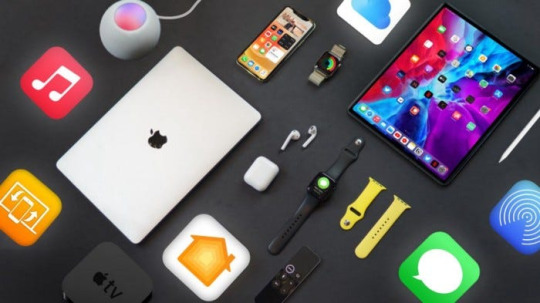
Within our group, all three of us possess at least one Apple product. Ranging from iPhones to iPads, it has become a daily part of our lives for school, extracurriculars, and entertainment. We aren’t the only ones following this trend. Almost every student at this school has an Apple product because of the ease of use and the ecosystem that has been developed in our society.
We can see this trend throughout the country and the figures below are justification to our claim.
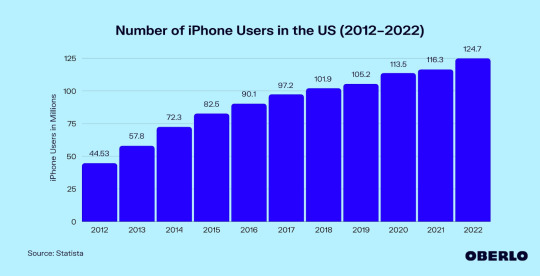
(Source: https://www.oberlo.com/statistics/how-many-americans-have-iphones)
Apple has become one of the world's largest companies in terms of market capitalization and specializes in the tech industry, a market highly demanded in today's society. With their rising influence and dominating power over the tech market, they have created their monopoly using their clever business model and innovations.
The above graph shows how the quantity produced relative to the demand has slowly been decreasing and the prices they set for their products have slowly been increasing to a monopolistic market. This shows their dominance in the tech market, especially the smartphone market. The company has total control over the prices they set and can affect the quantity they produce to maximize profits. The recent launch of the Apple Vision Pro is a great example of the above situation. The price set by Apple is much higher compared to the standard average for VR headsets- around $500. The Apple Vision Pro sells for about $3500, while it has many more features than a normal VR headset, the price still cannot be justified. However, customers who remain loyal to the brand continue to purchase the product despite its cons. One of the driving forces in their success as a monopoly figure is the brand loyalty that consumers have to Apple.
Brand Loyalty: They have created a reputable and strong brand name for themselves over the years and found their way in almost every corner of the world. Their brand image brings high loyalty within their customer base. Their loyalty and dedication to the brand reach the point where customers disregard other brands or any form of comparison with similar products and are blindly ready to pay a premium for Apple products.
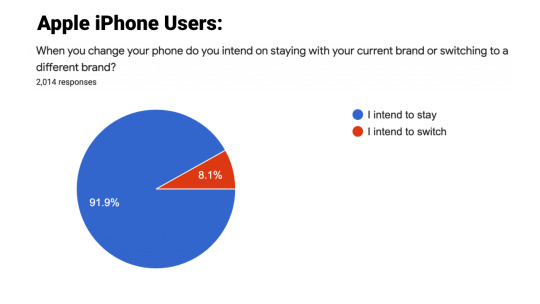
(source:https://www.pcmag.com/news/apple-iphone-brand-loyalty-in-us-at-all-time-high)
Apart from brand loyalty, Apple's clever business models compels customers to stay within the same operating system that Apple has developed and creates a situation where existing customers are more likely to return even with higher costs unless the opportunity cost of purchasing a different brand outweighs the switching cost. This situation is essentially created by the high switching cost associated with Apple products.
Switching costs: Their clever business plan arises from the intricate ecosystem they have created for themselves. Apple has its own (operating software) ecosystem which allows different Apple devices to work together effortlessly. But this ecosystem is not very friendly with other operating systems and switching to a different standard is accompanied by a time-consuming and expensive process. Androids tend to have a problem with syncing their operating systems to different devices as well. Since Android devices have so many different software for different companies, some of the operating systems aren’t compatible with each other causing a hindrance for buyers in the market. Because of this, the ease of use Apple provides brings up an opportunity cost that many aren’t willing to pay for an Android counterpart.
Outside of the market of the United States tells a different story. Now with experience as an international student from Dubai, United Arab Emirates, the market is slightly different. Internationally, Apple takes more of an oligopoly stance instead of a monopolistic one due to more fierce competition and stronger competitive influence on buyers.
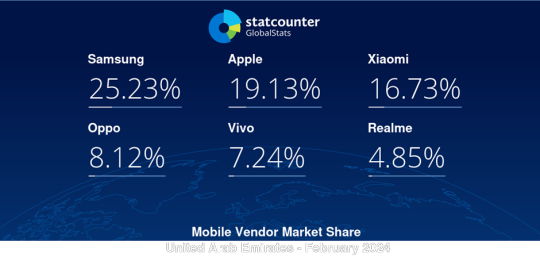
Since the market isn’t catered to Apple, there is not a huge difference in the desire for an Apple phone over an Android phone. Apple holds its ground similar to other phone providers in this market, but doesn’t overwhelm the market such as in the United States. More customizability options, constant advances in technology, and that same comfortability given by an Apple product is why a large percentage of the world outside of the United States relies on Androids. Although the market is split decently even between the major brands, Apple's influence is slowly making its way around the world.
Overall trends and the collective sheep herd mentality has led to people in the United States being prone to buying Apple products similar to their peers. Outside the country apple doesn’t have the same influence as the United States. A potential reason for the limited growth in other countries could be due to the weaker economies producing lower incomes and not being able to fit apple products in the budget curve.
While its influence is slowly growing due to world wide economic growth, there is still a long time before they hold a large portion of the market internationally. Market demand, compatibility, ease of use, and other factors are why people who have been dedicated to Apple have begun to turn their attention towards Apple and it may explain why a large percentage of Apple users have chosen to stay with their platform as a loyal customer for years. This makes Apple a strong company that is slowly turning into a natural monopoly, something that will affect the tech market for the years to come.
0 notes
Text
Oligopoly
In the complex web of economic systems that govern our world, the concept of oligopoly stands out as a fascinating and prevalent phenomenon. An oligopoly occurs when a market is dominated by a small number of large firms, often leading to limited competition. This economic structure has profound implications for consumers, businesses, and the overall market dynamics.
Typically, in an oligopolistic market, a handful of firms control a significant share of the total market. These firms wield substantial market power, allowing them to influence prices, output levels, and, in some cases, even collude to maintain their dominance.
One of the most striking examples of oligopoly exists in the global automobile industry. A small number of major players, such as Toyota, Ford, Volkswagen, and General Motors, control a significant portion of the market. These companies have the ability to impact pricing strategies, technological advancements, and industry trends. The close competition among these giants often leads to intense rivalry and strategic maneuvering.
The soft drink industry provides another compelling example of oligopoly. Companies like Coca-Cola and PepsiCo dominate the market, holding a duopoly that allows them to set prices, control distribution channels, and engage in aggressive marketing strategies. The barriers to entry in this industry are high, making it challenging for new players to disrupt the established order.
The tech industry, particularly in the realm of smartphones and operating systems, is characterized by oligopolistic features. Apple and Samsung, for instance, command a substantial share of the global smartphone market. Similarly, in the realm of operating systems, Microsoft and Apple hold significant sway. These firms not only compete but also shape industry standards and innovations.
Oligopolies have a profound impact on consumers, often resulting in both advantages and disadvantages. On the positive side, the intense competition among oligopolistic firms can drive innovation, pushing companies to invest in research and development to gain a competitive edge. However, the limited number of players can also lead to higher prices, as the dominant firms have the power to set and maintain premium pricing levels.
Governments often face challenges in regulating oligopolistic markets. Striking a balance between fostering healthy competition and preventing monopolistic behavior is a delicate task. Antitrust laws and regulatory bodies play a crucial role in ensuring that oligopolies do not engage in unfair practices that harm consumers or stifle innovation.
Xuanqi Zang
ID:30296276
0 notes
Text
Revolutionizing Supply Chain Management: A Look into Provenance's Blockchain Approach
By: Carla Chinski
Twitter: @thelatestbyte
Opening the Conversation: The Need for a Revolution
Supply chain management has always been a complex undertaking. Every product we purchase has a story, an often intricate journey it has taken from source to consumer that is usually hidden from view. Unscrupulous practices, environmental damage, and labor exploitation can lurk unseen in these opaque supply chains. But what if there was a way to make these chains transparent, verifiable, and efficient? Provenance, a UK-based tech company, thinks it has the answer: blockchain technology. Blockchain, the technology behind cryptocurrencies like Bitcoin, may seem an unusual solution to supply chain issues. At its core, blockchain is a type of database, a digital ledger that records transactions across many computers, so the record can't be altered retroactively. This provides a level of transparency and security that is transformative in the context of supply chain management.
It has been a fast and furious ascent for supply chain management via blockchain, but recent studies from 2023 show that not only can this technology “[reduce] the costs and time that arise in the supply chain, [by providing] significant advantages to enterprises such as the transparency of the operations performed.” It was only three years ago, in 2020, that whitepapers were published stating that one risk was that “there can still be human error or intentional misconduct in inputting the initial data onto the blockchain,” and that “Therefore, blockchain data is not perfect information.”
Tracing Back the Traditional Way: Quality Assurance and Traceability
Traditionally, traceability and quality assurance have relied on a mix of trust-based systems and bureaucratic oversight. From farm inspections for organic certification to third-party audits for fair trade, businesses have had to go through layers of verification to assure consumers about the quality and origin of their products. While verification is a necessary step, it often hinders innovation, which has been proven repeatedly; this is partly due to the mistrust innovation brings in the larger population. Going back to tradition, fairtrade might mean complying with laws against oligopolies and monopolistic practices, but it also implies making sure the value chain and its related information are evenly distributed across actors. However, traditional processes are not foolproof. They can be manipulated or corrupted, and they often lack transparency, making it difficult for consumers to verify the claims being made.
Moreover, traditional traceability systems tend to be linear and hierarchical. Information flows in one direction, and the power to verify and audit lies with a few key players. This centralization can lead to inefficiencies and vulnerabilities. Information can get lost or altered as it moves up the chain, and the system as a whole can be slow to respond to issues or changes.
Here, blocks act as protective walls of information processing that are very hard to bypass. Blockchain is now making internal operations concerning supply chains much more competitive, as it implies storing data from interconnected business processes as a private or hybrid information network. Customer relations, demand management, production flow, and stock management and storage are the main concerns in operations, no matter how big or small. Reducing operating costs, guaranteeing product stock, and reducing damages are secondary to providing what is called “service continuity.” In light of customer demands from e-commerce brands to be efficient and deliver on time and in regard to their promises, blockchain supply chain management is another important, though often invisible, link.
Today, perishable products and goods with quality assurance requirements by law must be treated with care, that is, through hybrid blockchain structures (that combine public and private information decentralization.) that allow for traceability in the traditional sense. Furthermore, using blockchain doesn’t mean that traditional tracking practices–or even those such as GPS mapping from a few decades ago–are being done with. Quite the contrary, auditing and tracking processes can integrate with other, prior digital systems.
Provenance in Practice: Real-world Impact
Provenance has already begun to demonstrate the real-world impact of its approach. In 2018, it partnered with the international food and beverage company, Princes, to track tuna from catch to can using blockchain. This pilot project allowed consumers to scan a code on the can and see the entire journey of the tuna inside, from the vessel that caught it to the cannery that processed it. The success of this project has led to others, from tracking organic cotton in fashion to verifying the authenticity of rare whiskies.
Provenance harnesses blockchain's decentralization and immutability to provide transparency and traceability in supply chains. Using their platform, every step of a product's journey can be securely recorded, from where a coffee bean was picked to where a diamond was mined, all the way to the end consumer. Provenance aims to use blockchain to instill trust and transparency into supply chains. This platform allows businesses to showcase the origin, journey, and impact of their products in a way that is secure, trustworthy, and accessible.
For businesses, Provenance could mean greater efficiency and reliability. Information can be recorded and verified in real-time, and there is no need for a centralized authority to manage the process. For consumers, it certainly means greater confidence in the products they buy. They can become a part of an end-to-end product journey, from origin to end consumer, and know that a trustworthy source has verified the information. But it's not just about transparency for consumers. Provenance's platform also benefits businesses by streamlining operations and building trust with consumers. By providing a clear and verified history of a product, businesses can differentiate themselves in a crowded market and build loyalty with conscious consumers. And, while Provenance's work is promising, the journey is just beginning. There are challenges to overcome, from the technological complexities of scaling up to the need for industry-wide acceptance and collaboration.
0 notes
Text
Big Tech is Likely to Set AI Policy in the U.S. We Can’t Let That Happen
New Post has been published on https://thedigitalinsider.com/big-tech-is-likely-to-set-ai-policy-in-the-u-s-we-cant-let-that-happen/
Big Tech is Likely to Set AI Policy in the U.S. We Can’t Let That Happen


Innovation is key to success in any area of tech, but for artificial intelligence, innovation is more than key – it’s essential. The world of AI is moving quickly, and many nations – especially China and Europe – are in a head-to-head competition with the US for leadership in this area. The winners of this competition will see huge advances in many areas – manufacturing, education, medicine, and much more – while the left-behinds will end up dependent on the good graces of the leading nations for the technology they need to move forward.
But new rules issued by the White House could stifle that innovation, including that coming from small and mid-size companies. On October 30th, the White House issued an “Executive Order on the Safe, Secure, and Trustworthy Development and Use of Artificial Intelligence,” which seeks to develop policy on a wide range of issues relating to AI. And while many would argue that we indeed do need rules to ensure that AI is used in a manner that serves us safely and securely, the EO, which calls for government agencies to make recommendations on AI policy, makes it likely that no AI companies other than the industry leaders – the near-oligopolies like Microsoft, IBM, Amazon, Alphabet (Google), and a handful of others – will have input on those policy recommendations. With AI a powerful technology that is so important to the future, it’s natural that governments would want to get involved – and the US has done just that. But the path proposed by the President is very likely to stifle, if not outright halt, AI innovation.
Pursuing important goals in the wrong way
A 110 page behemoth of a document, the EO seeks to ensure, among other things, that AI is “safe and secure,” that it “promotes responsible innovation, competition, and collaboration,” that AI development “supports American workers,” that “Americans’ privacy and civil liberties be protected,” and that AI is dedicated to “advancing equity and civil rights.” The EO calls for a series of committees and position papers to be released in the coming months that will facilitate the development of policy – and, crucially, limitations – on what can, or should, be developed by AI researchers and companies.
Those certainly sound like desirable goals, and they come in response to valid concerns that have been voiced both inside and outside the AI community. No one wants AI models that can generate fake video and images that are indiscernible from the real thing, because how would you be able to believe anything? Mass unemployment caused by the new technologies would be undesirable for society, and likely lead to social unrest – which would be bad for rich and poor alike. And inaccurate data due to racially or ethnically imbalanced data gathering mechanisms that could skew databases would, of course, produce skewed results in AI models – besides opening propagators of those systems to a world of lawsuits. It’s in the interest of not just the government, but the private sector as well, to ensure that AI is used responsibly and properly.
A larger more diverse range of experts should shape policy
At issue is the way the EO seeks to set policy, relying solely on top government officials and leading large tech firms. The Order initially calls for reports to be developed based on research and findings by dozens of bureaucrats and politicians, from the Secretary of State to the Assistant to the President and Director of the Gender Policy Council to “the heads of such other agencies, independent regulatory agencies, and executive offices” that the White House could recruit at any time. It’s based on these reports that the government will set AI policy. And the likelihood is that officials will get a great deal of their information for these reports, and set their policy recommendations, based on work from top experts who already likely work for top firms, while ignoring or excluding smaller and mid-size firms, which are often the true engines of AI innovation.
While the Secretary of the Treasury, for example, is likely to know a great deal about money supply, interest rate impacts, and foreign currency fluctuations, they are less likely to have such in-depth knowledge about the mechanics of AI – how machine learning would impact economic policy, how database models utilizing baskets of currency are built, and so on. That information is likely to come from experts – and officials will likely seek out information from the experts at largest and entrenched corporations that are already deeply enmeshed in AI.
There’s no problem with that, but we can’t ignore the innovative ideas and approaches that are found throughout the tech industry, and not just at the giants; the EO needs to include provisions to ensure that these companies are part of the conversation, and that their innovative ideas are taken into consideration when it comes to policy development. Such companies, according to many studies, including several by the World Economic Forum, are “catalysts for economic growth both globally and locally,” adding significant value to national GDPs.
Many of the technologies being developed by the tech giants, in fact, are not the fruits of their own research – but the result of acquisitions of smaller companies that invented and developed products, technologies, and even whole sectors of the tech economy. Startup Mobileye, for example, essentially invented the alert systems, now almost standard in all new cars, that utilize cameras and sensors that warn drivers they need to take action to avert an accident.And that’s just one example of hundreds of such companies acquired by companies like Alphabet, Apple, Microsoft, and other tech giants.
Driving Creative Innovation is Key
It’s input from small and mid-sized companies that we need in order to get a full picture of how AI will be used – and what AI policy should be all about. Relying on the AI tech oligopolies for policy guidance is almost a recipe for failure; as a company gets bigger, it’s almost inevitable that red tape and bureaucracy will get in the way, and some innovative ideas will fall by the wayside. And allowing the oligopolies to have exclusive control over policy recommendations will essentially just reinforce their leadership roles, not stimulate real competition and innovation, providing them with a regulatory competitive advantage – fostering a climate that is exactly the opposite of the innovative environment we need to remain ahead in this game. And the fact that proposals will have to be vetted by dozens of bureaucrats is no help, either.
If the White House feels a need to impose these rules on the AI industry, it has a responsibility to ensure that all voices – not just those of industry leaders – are heard. Failure to do that could result in policies that ignore, or outright ban, important areas where research needs to take place – areas that our competitors will not hesitate to explore and exploit. If we want to remain ahead of them, we can’t afford to stifle innovation – and we need to ensure that the voices of startups, those engines of innovation, are included in policy recommendations.
#ai#Amazon#apple#artificial#Artificial Intelligence#Cameras#Cars#catalysts#China#civil rights#climate#Collaboration#Community#Companies#course#data#Database#databases#deal#development#economic#economy#education#engines#Environment#equity#Europe#executive order#Full#Future
0 notes
Text
What is F(L)OSS about really? (Preview #1)
youtube
What is licensing, ownership and rights about?
I often describe such throughout the software domain but can easily be applied almost everywhere in society, like in hardware and culture. If I am not mistaken, it pertains to what you actually is your own, either it is home, furniture, computer hardware, software, artistic media, equipment, et cetera. Licensing is similar but has a more autonomous / shared ownership meaning applied.
And the reason why I believe that matters so much is because while the majority (of the human bell curve of demographics*) oftentimes ignore and brush off their personal agency on the wider scale of human planetary affairs, that attitude of distributing their energy & efforts towards current grand managerial bodies like big corporations and big governments is a quite short-sighted perspective and has a quite negative impact in our present day and potential future(s). It is not exclusively negative one-sided story but still, profiteers are not providing enough value for what you invest into their zone of control, monetary or otherwise... and that is very concerning considering the current global society context and the decisions made by such staff of managers & "drones".
The non-profit organization that is Creative Commons as well as my provided hyperlinks across this article should give you a decent insight into matters...
Spectrum of licensing paradigms

Copyright, the large landlords & proprietary ownership models pertain to the old Liberalism way of thinking (at least if we are to follow it under late-stage capitalism, liberalism and the philosophy of contemporary feudal US law). Not always bad and could really be better implemented as seen in the centuries prior to now.
(I mean, when things were less... structured, competitive, authoritative and rigid in the West and elsewhere, the autonomy and liberties allowed by such a paradigm of a abundance of workforce & income was nice to have and use, but not without some costs even then. Compared to now where things also have costs but as those grew for the low & middle classes and were not compensated by such rigid old models by the aging rich baby-boomers population yet, which is a shame considering all sides really could use a update / upgrade in their to persist in profits and long-term positive legacy.)
But as of today, it is so often misused and taken to extremely abusive extents as shown by the actions of major corporations going all over with massive-scale spying (look at Oracle data tracking record of like 5 billion people and growing), malevolent compliance (look at how both Apple and Microsoft comply heavily with US governmental guidelines for data collection, either by on-chip spyware or otherwise...), critical citizen censorship (like in Continental China, Russia and even the US of A as demonstrated by Edward Snowden's), corporate cooperation & corporative law-craft evils (Valve & Nintendo implicitly agreeing to shutdown Dolphin emulators on Steam, the way Microsoft-Mojang Minecraft falls apart over 1.19 update matters and how major corporations overall back each other up knowing their days are counted), vendor lock-ins, big tech oligopolies and marketshare dominions, expensive prices for very low value provided even for corporate agencies, too much managerial staff oversight control on decisions over workers, failing advertising economy, low-security bottlenecks with malware + botnets (thanks for the "infinite" loop of "security" with leaks, major failures & bulk password breakers trade market against consumers being traded against the will by black hat hackers & operatives that get paid by every irresponsible hidden or not governing bodies autonomously in lawful impunity, that unofficial though-police & cultural choices fails the potential of us all and will accelerate much the descent to further of a societal collapse that is entirely unnecessary if we are to rise to the stars on-time for the dream we were sold to in life), overstaffing & underpay (Amazon & every other mainline corporation abusing his employees for quicker short-term profit, paying very often low-as-in-slavery wages and Amazon taking full control of their employees' communication channels for drone promotion), menial purpose-less tasks and walled garden policies (looking at Apple's overpriced options being less competitive than the value and price paid for such, as well as the hopefully not soon Microsoft going onto such a exclusivity market that they alienate the best in their customer base into migrating away to non-exclusive environments like Linux), along many other situations / issues as revealed by information leaks & literal living in this global culture, both in explicit and implicit forms.
Copyleft, open source, free culture and library economy are the basics of our best bet to solve our current state of affairs, at least compared to what late-stage capitalists offer to us. Not the best thing forever more, but something quite more competitive and more appealing both short-term & long-term to the other corner in the licensing spectrum for the next few centuries, (or until the copyright catches up in given value to the customer and ethics to the lower classes fast but that's very unlikely due to the current rich folks' greed & ideology...) After all, today's enthusiasts, indie artists and modders are tomorrow developers, maintainers and architects.
Permissive licenses, public domain, and third-way alternatives?
~
Nuances on licensing
~
I have a fairly specific example in mind over one thing we should do better for despite the prejudices ill-fully distributed concerning AIs androids and other smart instruments. You see, as a sapient-kind that most likely desires progress and growth for yourself and potentially other individuals, we have a strong responsibility to cater and take care of both ourselves and every single thing we have agency over (to an agreeable extent ofc, not zealous over it) for both autonomous GAI agents and our current clade / species of humans alike... (there are likely aliens and further future humans species awaiting to be born from our efforts this century, unless the meta history is exclusively a job for some other elder sapient species coming before ourselves, which is extremely unlikely)
Seeing how the current mainstream APIs (even OpenAI and Stable Diffusion's) and datasets available for generative AIs, machine leaning models and other such autonomous agents are quite unethical / illegally acquired and heavily biased against a few core values we share instead of promoting the better parts of our psyche and species, I wanted to point out and encourage the independent & humanist re-developments of such technical promesses before the time when we might lose fully those freedoms / rights to develop the very basics of such future-oriented infrastructure.
After all, if we desire to make sure of both growth, progress, autonomy and abundance for us and our species now and onwards, we need to make sure that we get the rightful tools for stellar expansion on-time. And among those Quality-of-Life things that will help us by far for such a purpose and more will be a benevolent GAI (modular?) system. And that takes initial efforts and gentle caring humane guidance to show and bias such a GAI module into the brighter futures that we aim for really. Also, we should not screw up the future of our species (and other sapients') seeing how grand, and magnificent those futures are really headed towards. (See Stellaris, Isaac Arthur, melodysheep and Kurzgesagt)
That being said, I design my constructed world for multiple purposes including to emulate / simulate history, learn & develop my skills, advocate for my worldview and show to each and everyone why how and what matters for the prosperity of the whole species.
youtube
~?
youtube
Of course, here is the not-so-surprising cliffhanger twist ending of how all of it relates to (Woodrow) Wilsonism, global politics, socio-economics & the last half-millenium of historical patterns...
But that's for a later article. So take care and farewell!
0 notes
Quote
Every new tractor now contains built-in sensors that collect data and stream them to cloud-based infrastructures. The agribusinesses that use these data, like seed and chemical companies, are a form of “big tech” commerce operating alongside firms like Google and Facebook.
The Immaculate Conception of Data peeks behind the secretive legal agreements surrounding agricultural big data to trace how it is used and with what consequences. Agribusinesses are among the oldest oligopoly corporations in the world, and their concentration gives them an advantage over other food system actors.
Dr. Kelly Bronson publishes The Immaculate Conception of Data: Agribusiness, Activists, and Their Shared Politics of the Future | Centre for Law, Technology and Society | University of Ottawa
0 notes
Text
This day in history
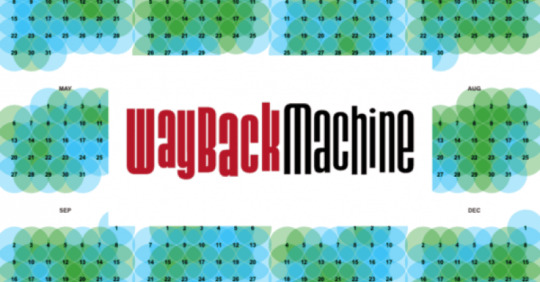
I'm on tour with my new, nationally bestselling novel The Bezzle! Catch me in TUCSON (Mar 9-10), then San Francisco (Mar 13), Anaheim, and more!

#20yrsago Lego Pantone values https://memex.craphound.com/2004/03/04/lego-pantone-values/
#20yrsago Mojo Nixon retiring https://web.archive.org/web/20040402054153/http://www.mojonixon.com/
#20yrsago Jay-Z construction set http://www.jayzconstructionset.com
#20yrsago Anthropomorphic Mars Rover LiveJournal https://opportunitygrrl.livejournal.com
#15yrsago Child in wet bathing suit made to stand in -5F weather because school policy forbade her from waiting in teacher’s car https://www.cbsnews.com/minnesota/news/teen-teachers-made-me-stand-outside-in-wet-bathing-suit-barefoot/
#10yrsago Data-compression with playing cards https://www.timwarriner.com/carddata/index.html
#10yrsago David Cameron’s porn-filter advisor arrested for possession of images of sexual abuse of children https://www.independent.co.uk/news/uk/crime/senior-tory-adviser-patrick-rock-arrested-on-child-pornography-allegations-9166837.html
#10yrsago Free download of danah boyd’s must-read book “It’s Complicated” https://www.zephoria.org/thoughts/archives/2014/03/03/its-complicated-open-access.html
#10yrsago Podcast: Cold Equations and Moral Hazard https://ia800202.us.archive.org/17/items/CoryDoctorowPodcast267ColdEquationsAndMoralHazard/Cory_Doctorow_Podcast_267_Cold_Equations_and_Moral_Hazard.mp3
#10yrsago Guy who “fixed” women’s computers spied through their webcams https://www.wired.co.uk/article/cyber-voyeur
#10yrsago Barrett Brown legal motion: linking is protected by the First Amendment https://web.archive.org/web/20140307111151/http://freebarrettbrown.org/right-to-link/
#5yrsago Fox News was always partisan, but now it is rudderless and “anti-democratic” https://www.newyorker.com/magazine/2019/03/11/the-making-of-the-fox-news-white-house
#5yrsago How the patent office’s lax standards gave Elizabeth Holmes the BS patents she needed to defraud investors and patients https://arstechnica.com/tech-policy/2019/03/theranos-how-a-broken-patent-system-sustained-its-decade-long-deception/
#5yrsago Open dataset of 1.78b links from the public web, 2016-2019 https://blog.gdeltproject.org/who-links-to-whom-the-30m-edge-gkg-outlink-domain-graph-april-2016-to-jan-2019/
#5yrsago Automated reception kiosks are a security dumpster fire https://securityintelligence.com/stranger-danger-x-force-red-finds-19-vulnerabilities-in-visitor-management-systems/
#5yrsago Alias: a smart-speaker “parasite” that blocks your speaker’s sensors until you activate it https://web.archive.org/web/20190321085518/https://bjoernkarmann.dk/project_alias
#5yrsago Financialization is wearing out its welcome https://www.ft.com/content/a9f13afc-3c3d-11e9-b856-5404d3811663
#5yrsago German data privacy commissioner says Article 13 inevitably leads to filters, which inevitably lead to internet “oligopoly” https://www.eff.org/deeplinks/2019/03/german-data-privacy-commissioner-says-article-13-inevitably-leads-filters-which
#5yrsago Tim Maughan’s Infinite Detail: a debut sf novel about counterculture, resistance, and the post-internet apocalypse https://memex.craphound.com/2019/03/04/tim-maughans-infinite-detail-a-debut-sf-novel-about-counterculture-resistance-and-the-post-internet-apocalypse/
#5yrsago Terra Nullius: Grifters, settler colonialism and “intellectual property” https://locusmag.com/2019/03/cory-doctorow-terra-nullius/
#5yrsago Leaked memo suggests that Google has not really canceled its censored, spying Chinese search tool https://theintercept.com/2019/03/04/google-ongoing-project-dragonfly/
#1yrago Solving the Moderator's Trilemma with Federation https://pluralistic.net/2023/03/04/pick-all-three/#agonism
2 notes
·
View notes
Text
Some one asks me,what would i be and what life situation i want to find myself in five years.
Well,not much of a crazy life changing will come,to my knowledge and negative point of view.even though now we are facing world wide economic challenges,viruses,uncertainty of new technologies related conflicts. the more things change the more they stay the same,histories are the same,we are only human after all.
Back to the topic, i wanna be a STEM dork,recently I’m thinking about the field of electrical engineering/chips,or robotic/automation,i feel like with the emerging of those fast evolving AI,they are coming hot with lots of endorsers and hype,big investment pouring on the table,look at those CGs they made, words they output,it’s safe to say it will be the next singularity with all that support.
So now I assume that we got a fast worker,high yield producer/artist,super smart scientist,what it needs is a carrier,so better circuit,chips make them faster,exist in every corner,and a robotic body will maximize their value of serving us,fully benefit the mankind,and it makes more sense if we realize we are facing another global problem—aging population. That means a huge shortage of labor forces in different job sites,and a big needs of health caring experts.it clicks,louder and louder
I’m Imaging a society that doesn’t require regular folks to do a 9 to 5,another day another dollar job but got rationed of credits bi-week because with the advanced automation,mass production is too efficient for small population,that basic daily supplies are enough for all the people,without oligopoly controlled capitalism,no more tempting stuff,no sensation provocative products,no hidden plots that make you overwhelmed with dopamine.without competition,there isn’t much variety,but simple,honest goods and service.that’s what my ideal society would be like.
My fantasy of events would be,androids taking care of the whole house missions,helping kids and the elderly to live better(freeing human from daily burdens),me taking my hot 3D printed breakfast that takes 2 points of credit(just a reminder of limited resources)into a public reserved self driving vehicle headed to the art center (probably art is the last position human hold) at 11am, to go there for learning how to brush paint a massive canvass using multi robotic arms with the help of androids so no one will hurt in the scene(corporation with AI,to know them better).not to worry about if these kinds of skill set are demanding or not, so to get a Job to feed myself and my family.
maybe human will be satisfied with their needs and greediness after massive production improvement and switch to minimalism. That’s probably the only way we can get out off the hustle and bustle,dopamine rampant swamp.
Im not going to talk about all the related contentions,the impact of the androids and automation toward the society,and I realized I am far from my topic.
Not much can get me excited because I’ve been numb long ago I’ve overdosed with dopamine.but I got goose bumps every time I think that,one day I can live in a cyberpunk world(not the game,but if it’s like a game it’d probably be like Detroit became human lol),embrace it’s both sides.oh man,I wish I could go back to school without the fear of failure and insecurity.
I wish in five years,I can graduate and get the entry ticket,join a tech giant and work at the AI engineering related department,androids,automation,smart vehicle, 3D printing appliances,whatever,as long as I can work in the front line and do some constructions,to witness the ups and downs of this filed,take the responsibilities,solving problems by all means.
0 notes
Text
Lenovo and Oligopoly
Gavin Fujimoto [email protected] 23782704
Discussion Time: Friday 11:00 AM - 11:50 AM

I have been in the market for a new laptop for a long time. However, a combination of circumstances made the purchase undesirable. The COVID pandemic changed many consumer preferences, shifting the demand curve for a variety of products including the extremely coveted commodity called toilet paper.
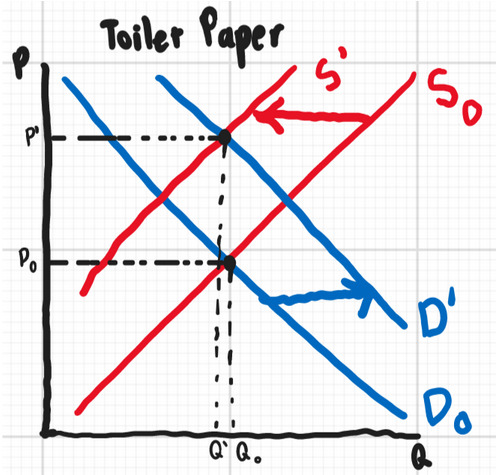
Supply issues and increased demand due to quarantine increased prices (quantity is ambiguous).
In addition, a computer chip shortage caused by supply issues led to a decrease in supply and increase in price of laptops. Demand for laptops also increased due to a large-scale shift to working from home.

The decrease in supply of computer chips raised its price. The price of producing a laptop increases by the same amount. Combined with the increase in demand due to working from home, the price increases (quantity is ambiguous).
The slow return to normalcy gradually undid these effects and prices decreased to or below previous levels. When searching for a laptop, my primary consideration was the price. I did not need an incredibly capable computer, only enough to handle light schoolwork. My needs happened to coincide with a beneficial shift in the demand curve. The beginning of the new year is typically when tech companies release major updates about upcoming technology and release new devices. Consumers will prefer to purchase the latest laptops with the newest components. Demand for older laptops decreases.

The release of new laptops decreases the demand for old laptops, lowering their price and quantity produced.
The release of the 13th generation Intel CPUs shifted the demand and price for laptops with 12th generation CPUs. I purchased a Lenovo laptop for $400, $200 less than the retail price. Although many laptops were offered at the same price, I determined that this laptop provided the most utility, primarily because it was a touchscreen 2-in-1. I also purchased a stylus. In general, if the price of touchscreen laptops decreased, the demand and therefore price for styli would increase since they are complementary goods.
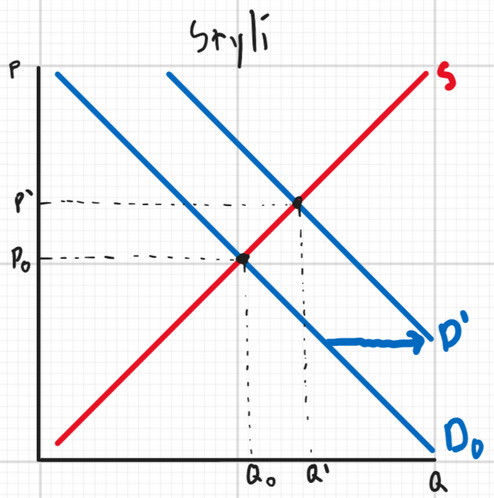
The decrease in the price of touchscreen laptops increases the demand, equilibrium price, and equilibrium quantity of styli.
I was satisfied with my purchase, and that was the end of my economic exchange. However, while browsing the official Lenovo site, I noticed more than a handful of less satisfactory “deals” such as:

Although it may seem like a steal, the laptop still cost a hefty $949 for disappointingly average computer components. Why were the prices so high just to be marked off at unbelievable rates? My initial assumption was that the large discounts encouraged impulse purchases since the offers were limited time only. Consumers might feel like they were saving more even if the device’s sale price was comparable to other suppliers. This capitalizes on the assumption that the consumer is not perfectly-informed in contrast to the rational choice theory. The average conscientious consumer, however, would clearly see through this ploy and potentially even prefer a product with more transparent pricing. How does Lenovo remain competitive?
Lenovo has its own niche in the electronic device market. They primarily produce business-grade laptops known for quality. While other companies cater to individual consumers, Lenovo primarily serves businesses. They are able to produce large quantities of a single product to be sold in bulk at lower prices than other companies. In this sense, the company is part of a small natural oligopoly with relatively few other companies able to efficiently offer the same type or quality of services due to economies of scale.
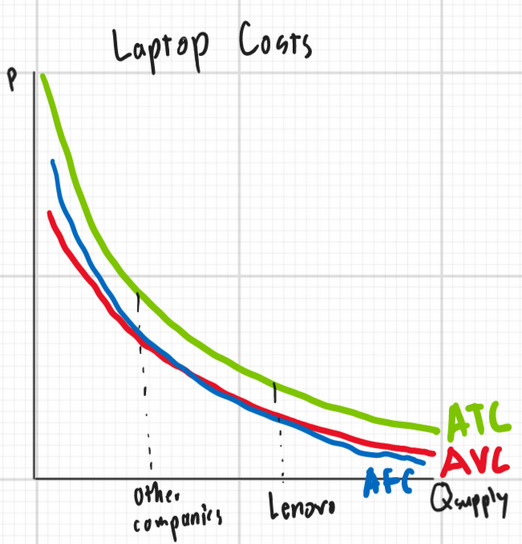
By producing laptops in large quantities, Lenovo can operate more efficiently and limit the number of competitors. The company’s average total cost is lower than other companies.
Businesses are willing to pay more for the product because they often have higher budgets and Lenovo has built a reputation for high-quality products and offers both convenience and support. The lack of competition allows Lenovo to set their own price and quantity while still making a sizable profit. Through this lens, the massive sales and resulting price difference is a consequence of price discrimination. In a typical graph of a monopolistic market, a supplier will produce where marginal cost equals marginal revenue to maximize profits. However, this results in a region of deadweight loss where the demand still exceeds marginal costs. Businesses will buy at a higher price. To capture the deadweight loss, the company can sell additional units at a lower price closer to the competitive market equilibrium. This “sale” price prompts consumption from primarily individual consumers who would not have otherwise purchased a device at regular price.
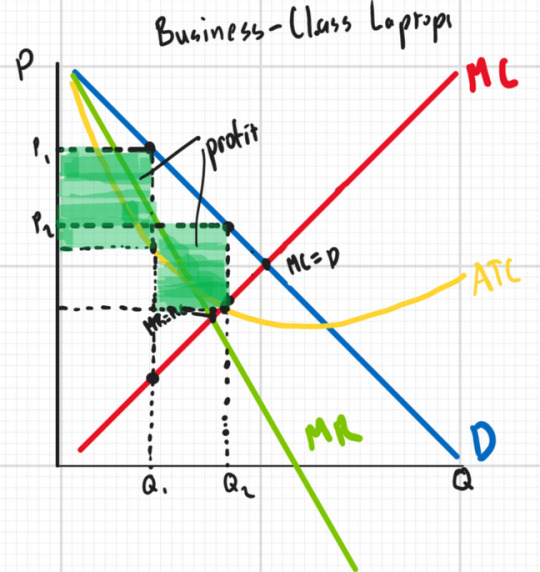
A price-discriminating oligopoly will sell at different prices to different consumer groups. This allows them to generate more profit.
My assumption neglected the value of quality which matters a lot more to a business who has to purchase hundreds of laptops than the individual consumer. Products are actually sold at the higher price and are not just to trick consumers into thinking they got a phenomenal, but a quest to maximize profits by abiding by the laws of economics.
Works Cited: Scott, Hilda. “Lenovo Annual Sale Knocks up to 73% off Lenovo ThinkPad T14s Laptops.” LaptopMag, Laptop Mag, 7 Mar. 2023, https://www.laptopmag.com/news/lenovo-annual-sale-knocks-up-to-72-off-lenovo-thinkpad-t14s-laptops.
0 notes